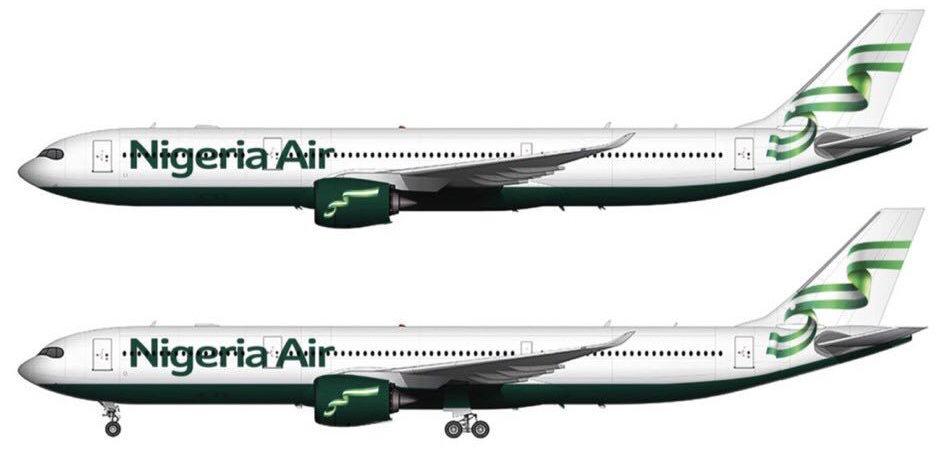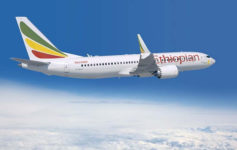We’ve seen many surprises at the Farnborough Airshow this week, including the birth of a new airline. But the politics behind it are even more interesting.
Nigeria has struggled to maintain a viable flag carrier over the decades. Nigeria Airways failed. Air Nigeria failed. Arik, a public-private partnership, has largely failed. But yesterday, Nigeria Air was born…well, at least conceived.

The carrier plans 84 routes and is mulling A330 orders, among others. Like Arik, it will be a public/private partnership. What will make this airline different, besides the livery?
It may be Ethiopian Airlines.
Ethiopian Airlines is Africa’s largest airlines and also consistently profitable. As Ethiopia has sought to assert influence in the region, it has also become an investor in other airlines. Per Bloomberg:
Ethiopian Air already owns stakes in Malawi Airlines and Togo-based Asky Airlines and aims to secure equity holdings in new carriers in Zambia, Chad, Mozambique and Guinea by the end of the year while helping to manage existing operators in Equatorial Guinea and Democratic Republic of Congo.
Earlier Tuesday the government announced plans for the company to buy a 20 percent stake in Eritrea Airlines as part of a new peace deal, with flights between the neighboring states starting Wednesday.
Next up: Nigeria. Tewolde GebreMariam, Ethiopian’s CEO, sat down with Nigerian officials earlier this week to discuss investment in Nigeria Air. No formal announcement has been made, but a backing by Ethiopia could this latest Nigerian start-up the boost it needs to get off the ground.
For his part, Tewolde expects Ethiopian Airlines will not be the only investor looking toward Nigeria, singling out the eccentric CEO of Qatar Airways, Akbar Al Baker, by name. Baker has thus far denied any interest in a Nigerian investment.
CONCLUSION
A cautionary tale for Ethiopian Airlines: aviation unions are already protesting, saying the government still owes them money from now defunct Nigeria Airways. I hope Ethiopian Airlines, which has performed so well, will not go down the Etihad Airways investment path…which only led to destruction.




The problem with most government owned airlines esp in Africa is appointing politicians to manage the airlines rather than professionals. Things can only go down the toilet with these kleptocrats in charge.
No doubt, corruption, which the new normal in Nigeria will not all the project to come to fruition. It is unimaginable, that Nigeria, the acclaimed giant of Africa does not have a flagship airline carrier. It’s shameful.
A few comments :
1) Arik was not a public-private partnership. It was a purely private airline / alleged money laundering scheme until it reached the point of near insolvency at which time it was partially nationalised (some assets taken over by Asset Management Corporation of Nigeria – AMCON) to prevent a complete shutdown as it was deemed a strategic national interest and “too big to fail”.
2) The Government of Nigeria actually approached ET after AMCON’s takeover of Arik’s assets with a proposal for ET to take over management of Arik. It was evaluated at the time and ET walked away as they felt that the rot at Arik was too deep. However, ET has to keep the Nigerians friendly as Nigeria is a huge source of ET’s revenue (they fly to Lagos, Abuja, Kano, Kaduna and Enugu) and in the past they have been restricted from repatriating their earnings out of Nigeria when they have upset the Government. Whether this is simply one of those moves to appease the Government of Nigeria by indirectly lending their name to the venture at the beginning to build credibility, or whether they genuinely intend to be involved as a minority stakehoulder, remains to be seen.
3) ET’s strategy of partnership/investment in other African carriers to support the “multiple African hub concept” has been around for 15 years since the days of Ato Girma Wake. Tewolde has inherited and built on the strategy (he was part of the Executive Team too back then although not in charge of this area – Tewolde was in marketing while Kinfe Kahssaye drove their strategic projects). Their initial plan was an investment/strategic partnership with Ghana’s new national airline in 2004-5 which was fully negotiated and ready to close, but that deal fell through at the last minute due to local Ghanaian politics. They then moved their focus to Togo next door and the result was ASKY which has grown from strength to strength, but with very strict Ethiopian management control. Malawian Airlines is another carrier where ET maintains strict management control despite a minority stake. Other deals in Africa have fallen through over the issue of management controls – ET has shown its willingness to walk away if their conditions are not met. Tewolde is no fool and despite the huge expansion of ET under his watch, is actually a very conservative manager with a low risk appetite. The anti-James Hogan if you will.
4) The “investment” in Eritrean Airlines is a different ballgame. It is a political move intended to funnel aid to the prodigal brother under a cloak of investment. I presume it will be written off the moment it leaves the bank account.
No Nigerian airline which has the Nigerian government as any part of its ownership or control structure can possibly survive in the long term, as it will be driven not by market forces, but by corruption and cronyism.
I think the only way to get this airline off the ground (Proud of that pun) is if it becomes a partly/majority owned subsidiary of Ethiopian Airlines rather than the Etihad Airline group style mess.
Etihad just bought into desperate airlines and threw money at them rather than trying to turn a profit.
I believe if it became a subsidiary it will have a more profit focused mission and ethiopian will be able to exert a lot more managerial control.
Altough didn’t Virgin start up Air Nigeria and had a controling stake but the government ruined it?
Altough it’s nice to see new airlines I think it might for the time being at leat be only foreign airlines that will provide reliable air travel for Nigerians.